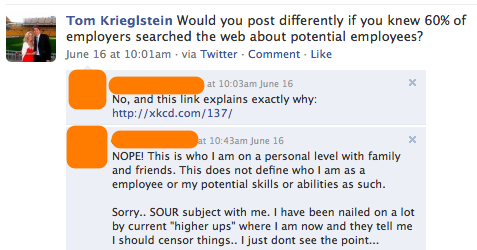Two weeks ago, I asked my Facebook followers if they’d post differently knowing that 60% of employers search the web when considering potential employees. Several students came back with strongly worded annoyances about not wanting to change their online behavior:
Then my adult friends chimed in:
Though we were talking about online behavior, the difference in opinion between students and adults highlights that adolescent behavior online is no different than adolescent behavior offline. And the gap between adult cognitive processing and adolescent cognitive processing is still tangible.
The cognitive processing gap reminded me of the September 2008 Time Magazine cover story that took an in-depth look at the adolescent brain, led by Dr. Jay Giedd of the National Institute of Mental Health. The goal of the study was to:
… determine how the brain develops from childhood into adolescence and on into early adulthood.
After 1800 teenage participants and 13 years of research, Dr. Giedd is convinced we have miscalculated the links between adolescent behavior and adolescent brain development.
… the wild conduct once blamed on “raging hormones” is being seen as the by-product of two factors: a surfeit of hormones, yes, but also a paucity of the cognitive controls needed for mature behavior.
Dr. Giedd explains how brains generally develop from back to front. With the prefrontal being the last section to fully develop around 25.
The very last part of the brain to be pruned and shaped to its adult dimensions is the prefrontal cortex, home of the so-called executive functions–planning, setting priorities, organizing thoughts, suppressing impulses, weighing the consequences of one’s actions.
“Scientists and the general public had attributed the bad decisions teens make to hormonal changes,” says Elizabeth Sowell, a UCLA neuroscientist. “But once we started mapping where and when the brain changes were happening, we could say, Aha, the part of the brain that makes teenagers more responsible is not finished maturing yet.”
… the parts for exercising judgment are still maturing throughout the course of adolescence. So you’ve got this time gap between when things impel kids toward taking risks early in adolescence, and when things that allow people to think before they act come online. It’s like turning on the engine of a car without a skilled driver at the wheel.”
In light of these new findings, even the American Bar Association has urged state legislatures to ban the death penalty for juveniles:
“For social and biological reasons, teens have increased difficulty making mature decisions and understanding the consequences of their actions.”
Going back to my original Facebook question, it seems like Dr. Giedd’s study is playing out in real-time on the internet with employee/employer relationships.
The 2009 Deloitte LLP Ethics & Workplace Survey** found that 60% of business executives say they have a “right to know” how employees portray themselves and their organizations online and 30% admit to “informally monitoring social networking sites.” In reaction, 53% of employees said their social networking pages are none of their employers’ business and 61% say that even if employers are monitoring, they won’t change their online behavior.
We have a classic chicken/egg challenge. Will adolescents change their behavior online to suit their current or future employer’s needs, or will employers change their attitudes about online behavior knowing that the prefrontal doesn’t fully develop until 25?
Dr. Giedd jokes that at least the rental car industry has it right because you can’t rent a car until you’re 25.
I tend to think that as more of our adolescent years are played out and recorded online forever, societal attitudes will shift towards a greater acknowledgment of “oh those were his/her adolescent years” and put less long-term judgment on those actions.
It will be interesting to see our first “Facebook President,” or watch a parent tell a child not to do something and the child turns around and Googles a video and picture of the parent doing the exact same thing.




